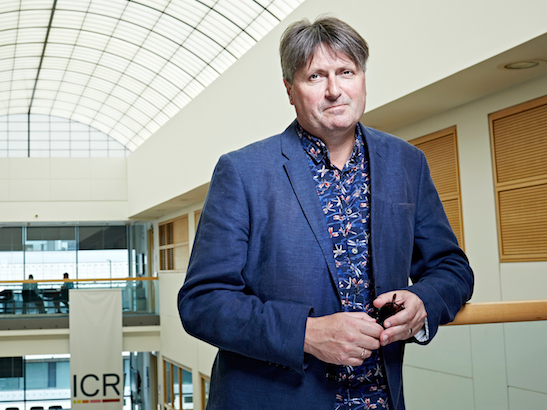Watch Poet Laureate Simon Armitage recite his latest poem - Finishing It.
Newly appointed Poet Laureate Simon Armitage has written a poem for The Institute of Cancer Research, London, symbolising the goal of precision science to turn cancer into a manageable disease.
The Institute of Cancer Research (ICR) commissioned micro-engraver Graham Short to meticulously carve the entire 51-word poem clearly onto the 20mm long and 10mm wide pill. The engraved tablet will be displayed permanently in the new Centre for Cancer Drug Discovery, when it opens later next year.
The Centre will see a new collaboration of hundreds of scientists from different disciplines come together to lead an unprecedented ‘Darwinian’ drug discovery programme that aims to overcome cancer’s ability to adapt and evolve resistance to drugs. This could turn cancer into a manageable disease that can be controlled long term and effectively cured. However, the building that will host them needs an additional £2m in donations to be completed and for the scientists to be able to start their urgent work in finishing cancer.
The pill will be displayed in the new Centre once the building is completed. To donate to the new Centre for Cancer Drug Discovery, please click below.
Conveying precision science
Drawing inspiration from the work that the ICR will undertake in the new Centre for Cancer Drug Discovery, Simon’s poem – only his second as Poet Laureate – reflects on the ambition, optimism and brilliance that all form a part of the search for new precision treatments for cancer.
Entitled Finishing It, Simon’s poem, and the micro-engraving of it, convey the incredible precision science underpinning a new generation of cancer treatments in the new centre:
Finishing It
I can’t configure
a tablet
chiselled by God’s finger
or forge
a scrawled prescription,
but here’s an inscription, formed
on the small white dot
of its own
full stop,
the sugared pill
of a poem, one sentence
that speaks ill
of illness itself, bullet
with cancer’s name
carved brazenly on it.
Science and poetry
Graham Short carefully engraved the poem onto a replica anti-cancer pill, which represents the drugs the ICR will be discovering through pioneering team science within the new building.
Poet Laureate Simon Armitage said: “Science and poetry are closer associates than many people assume, and it was exciting to work on a project that deals with cutting edge medical research. And like science, poetry is a “what if” activity, imagining outcomes and possibilities based creative thinking.
“I liked the sense that poem and pill might collaborate to produce both a medical and emotional cure, and that something so minimalist could aim to bring down something so enormous and destructive. I experimented for a long time with the language - the shortest poems are always the hardest to write, their smallness making them so much more conspicuous and vulnerable.”
Our new building will provide us with the optimum environment for creative collaboration between scientific disciplines, so that we can accelerate our work to identify new ways to treat cancer.
Poem symbolises 'the hope of what’s to come'
Professor Paul Workman, Chief Executive of The Institute of Cancer Research, London, said: “Simon Armitage’s poem engraved on a pill perfectly conveys the exquisite precision of the work the ICR’s scientists will be conducting in our new Centre for Cancer Drug Discovery. Our researchers are focusing on understanding, predicting and blocking the evolution of cancer, aiming to stay one step ahead of the disease using precision medicine and drug combinations, so that we can achieve long-term survival and cure.
“We still have £5million to raise in order to complete the Centre so we can bring together – under one roof – experts in cancer drug discovery, computational big data and AI, alongside others studying evolution in cells, animals and individual patients. The aim is to create a new generation of cancer medicines.”
Dr Olivia Rossanese, who will be Head of Biology in the new Centre for Cancer Drug Discovery, said: “This Centre for Cancer Drug Discovery will offer a completely new and remarkable way of working. We’ll have computational biologists, geneticists, evolutionary scientists and drug discovery researchers all working hand-in-hand in an unprecedented way to find new treatments that can overcome cancer evolution and drug resistance.
“The poem beautifully shares our story and symbolises the hope of what’s to come, the message made more powerful by being engraved onto a pill that represents the kinds of treatments that we will be developing in the very near future.”
Find out more about our revolutionary new building in which we aim to transform the future of cancer treatment and please donate to support the vital research that will take place there.
Updated 2020-05-22 to reflect reduced fundraising target.
